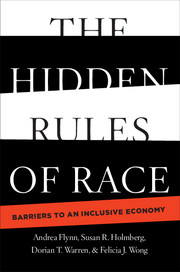'The Hidden Rules of Race shines an objective light on the discriminatory systems and structures that perpetuate disparities between black and white Americans. The authors’ call for a comprehensive reorientation of our perspective on economic and racial inequality is bold, timely, and deeply necessary for those of us who wish to build a more inclusive future.'
Darren Walker - President, Ford Foundation
'Anyone focused on social change knows that there are a set of written and unwritten rules that incentivize and fortify the status quo. The work of social change - the work of undoing racism - is changing those rules. In The Hidden Rules of Race, the team at Roosevelt has created a clear and actionable analysis, instrumental to identifying some of the most important interventions we can make, and to help us do the work better.'
Rashad Robinson - Executive Director, Color of Change
'Race matters. As our racial landscape dramatically changes, we must pay more attention to the racial inequities that continue to plague many communities of color. In The Hidden Rules of Race, we get a roadmap to why and how we must rewrite the racial rules in order to pave the way for racial and economic justice.'
Deepa Iyer - Senior Fellow, Center for Social Inclusion
'For too long, efforts to combat racial inequalities have been pitted against efforts to combat economic inequalities, in ways that have only empowered those who benefit from both. The authors of The Hidden Rules of Race show how in virtually all spheres of American life, the nation operates with explicit and tacit rules that perpetuate both race and class inequities. They advance proposals that should be central to national debates on how to pursue more truly equal rights and opportunities for all.'
Rogers M. Smith - Christopher H. Browne Distinguished Professor of Political Science, University of Pennsylvania
'This book draws on a variety of data sources and methods to demonstrate how the racial rules affecting wealth, income, education, criminal justice, health, and democratic participation continue to produce suboptimal outcomes in the largest economy in the world. It identifies not only rules that exclude large numbers of people from participating fully in the economy and in society, it also provides examples of rules that have minimized inequality and that produce greater equity. To say that The Hidden Rules of Race gives timely clarity to one of the most pressing and fundamental issues in our society today would be a vast understatement. This is essential reading for economists, policymakers, corporate leaders, and all participants in our modern economy and society who would like to see [black Americans] achieve their maximum potential.'
Lisa D. Cook - Associate Professor of Economics and International Relations, Michigan State University



